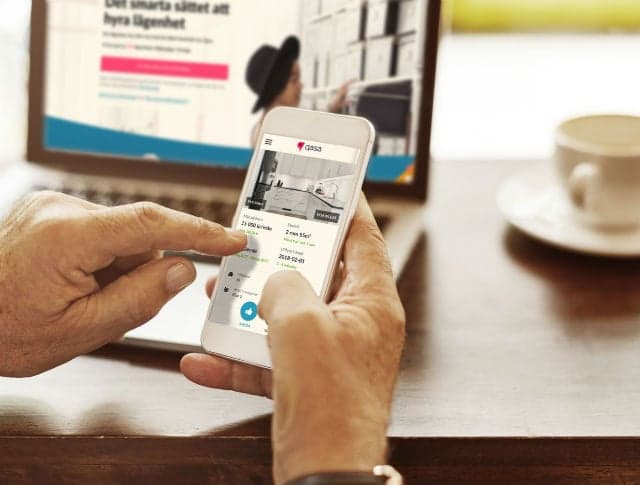Accommodation 101: How to rent an apartment in Sweden
To describe it as ‘difficult’ to find a rental apartment in Sweden would be an understatement. In fact, it can be such a pain that some people give up altogether and move elsewhere. Don’t be one of them, here are some tips to help you navigate the Swedish rental market.

Let’s start at the very beginning. In Sweden, there are two basic types of leases. There’s the notoriously hard-to-acquire ‘first-hand’ contract (förstahandskontrakt) which is an apartment owned and rented out by a municipality or state-regulated rental company.
To get a first-hand apartment (första hand) you need to register with your municipality and join a waiting list. In the larger cities, you may be waiting for several years. In Stockholm, for example, there is currently a queue time of between 7 to 11 years.
If you’re new to Sweden and need somewhere to live within the next decade then you’ll probably have better luck finding a sublet apartment (andra hand). Like job hunting, you may need to dedicate a few intense days to finding an apartment (and once you do, act quick).
Where to find rental apartments in Sweden
Your first port of call should be Qasa, the largest marketplace for rental apartments available in English. It’s like an Airbnb for long-term rentals, making subletting safe and easy throughout your stay in Sweden. Setting up a profile is free and there are no sneaky hidden fees waiting to jump out at the last minute.
Blocket is another website where you can browse apartment listings. It’s a more traditional classified site that isn’t purely focused on home rentals (there’s a great furniture section to browse once you have found the perfect dwelling) and is only available in Swedish. The good news is that Qasa has a partnership with Blocket so you can easily apply to their best apartments directly from both platforms.
 Photo: Qasa
Photo: QasaHow to stand out from other applicants
Competition is fierce on the Swedish rental market. Unlike some countries where you can simply sign for an apartment on the spot, in Sweden you often have to make your case for why a landlord should pick you.
Start by creating a free profile on Qasa to showcase the best version of yourself when applying for rental homes. Think of it as your digital resume for finding a home; here you can gather your references, prove your credit worthiness and show potential landlords just how fantastic you are.
If you still don’t have a Swedish personal number (personnummer), it’s advisable to have your employer also sign your rental contract. This will make you more appealing to landlords as they have some form of guarantee that you are trustworthy and can pay the rent. So before you start looking for an apartment, double check to find out if this is an option for you. Don't worry if it’s not an option for you, Qasa still allows you to do everything without a personal number.
Time is of the essence
Speed is imperative but at the same time it can be tough finding the few homes that match all your criteria. The good news is there are tools that can help you. When you create a profile on Qasa, you’ll be notified the moment anything that suits your preferences becomes available. Once you get the notification, you can apply for that home with just one click.
Create your free Qasa profile and find your perfect apartment in Sweden
Keep your wits about you
Rental scams are a big problem in many countries and Sweden is no exception. Fortunately, there are ways to protect yourself. Provided you don’t sign any rental agreements on your own or make any payments without an intermediary, you have nothing to worry about.
Qasa provides the leading anti-fraud system on the market. Besides being incredibly easy to sign an agreement (everything is done digitally), they also secure your deposit in a separate escrow account. Your first month’s rent is then paid by Qasa to your landlord a week after you’ve moved in. This makes it impossible for a scammer to access your money prematurely and gives you time to move in and check everything is in order. It also means you can sign a rental agreement whilst still living abroad so you can move into your apartment the moment you touchdown in Sweden! How easy is that?
Here are some more tips to help you avoid falling prey to rental fraud.
Make yourself at home
Once the contract has been signed and you’ve moved into your new home, it’s time to make it your own. You’re living in the birthplace of IKEA so you’re hardly ever further than a stone’s throw away from one of its stores; there are also plenty of established online markets for furniture, art and other types of interior decor (we’ve already mentioned Blocket) to help you put your stamp on your new apartment.
Välkomna and you’re welcome!
This article was produced by The Local Creative Studio and sponsored by QASA.
This content was paid for by an advertiser and produced by The Local's Creative Studio.

Join the conversation in our comments section below. Share your own views and experience and if you have a question or suggestion for our journalists then email us at [email protected].
Please keep comments civil, constructive and on topic – and make sure to read our terms of use before getting involved.
Please log in here to leave a comment.